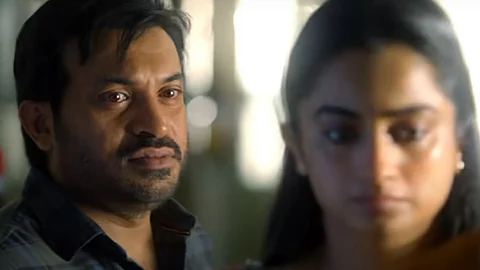

For a good half of Machante Malakha, even as you become increasingly frustrated by the poor writing, especially of the female characters, you might put it down to bad filmmaking, not suspecting an agenda behind it. However, further into the movie, you realise that it is not just a case of bad writing, but that the idea is to make the women look horrible — for this is a film about men’s rights, and how all the poor males in the world are made to suffer at the hands of cruel, merciless women. Not even going to use double quotes over poor, cruel, and merciless here, it’s far too obvious.
The film does not limit itself to one caricature of the rotten-apple woman. Namitha Pramod, playing the female lead (Bijimol), happens to be the younger, lighter version of her much more rotten mother, played by Shanthi Krishna. All their spite is directed at the respective men in their lives, and for good measure, the other men surrounding them. Soubin Shahir, playing the male lead, becomes the model for the poor abused man, bearing so much suffering that all he seemed to lack was a cross to bear. But Soubin is diminutive, and the writers want to make it clear that this is the fate of all men, not just the weak ones. They add stronger, heavier men to the picture — like Dileesh Pothan and Vineeth Thattil David — to convey that all men, big and small, are victims of female wrath.
Director Boban Samuel, known to make comedies, tries to give a coating of humour to the men’s misery. But the attempts at humour are as lost as the last bit of sense you’d hope to see on screen. The film begins with a woman dumping Sajeevan (Soubin) when she finds a better alliance, and if you spot the speed with which she appears in front of him in bridal costume, you can make out the writers’ idea of humour. Their portrayal of the typical woman had already begun. Nearly every woman making an entrance is given one or another shade of brutality. Sajeevan’s heavyset male friend (Vineeth) does not have the heart to put a knife on a chicken he wants cooked, so his wife takes the weapon and slashes 25 of them.
Bijimol’s (Namitha) attacks are more verbal. From the outset, her behaviour is so very toxic that you might have sided with Soubin’s victimised role if the writing was any better. In their eagerness to depict the evilness of womankind, the writers must have forgotten the basic principle of making the film interesting. In fact, a movie featuring horrible women in the lead, written well, could actually make for a good subject. This could have been a nice satire, perhaps set in a parallel universe where gender roles are reversed. But these writers are serious about their message. In one scene, Dhyan Sreenivasan, playing a lawyer, stands before a banner for the All Kerala Men’s Association to speak about the neglected rights of men, even as a member onstage is shepherded off by a woman. The script also keeps spouting murmurs about the law being on the side of the woman, not even attempting to sugarcoat its anti-woman agenda.
Short of making the women physically abusive (except for the mention of chicken slaughter), Boban and his writers — Jexson Antony and Ajeesh P Thomas — present a hagiography for the meninists. They seem to want this to be the men’s side of The Great Indian Kitchen (although, what would that be - The Great Indian Washroom?). The film comes at a time when misogynists, under the guise of social media gurus, have taken on the role of influencing young men and boys into belittling women and injecting toxic patriarchal ideas into their minds. It arrives when men’s rights activists gather outside a jail to give a hero’s welcome to a man accused of raping a woman actor on the roads of Kochi. There is no mistaking the film for anything other than misogynistic propaganda, shoddily done.
Disclaimer: This review was not paid for or commissioned by anyone associated with the film. Neither TNM nor any of its reviewers have any sort of business relationship with the film’s producers or any other members of its cast and crew.